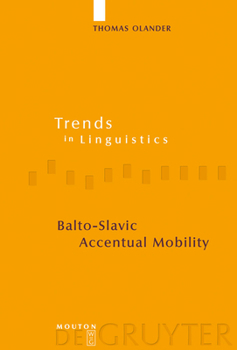Balto-Slavic Accentual Mobility
Why does the accent jump back and forth in Russian words like golov 'head', acc. g lovu, gen. golov , dat. golov etc.? How come we find similar alternations in other Slavic languages and in a Baltic language like Lithuanian? The quest for the origin of the so-called "mobile accent paradigms" of Baltic and Slavic leads the reader through other Indo-European language branches such as Indo-Iranian, Greek and Germanic, all of which are relevant...
Format:Hardcover
Language:English
ISBN:3110203979
ISBN13:9783110203974
Release Date:February 2009
Publisher:de Gruyter Mouton
Length:285 Pages
Weight:1.28 lbs.
Dimensions:0.7" x 6.1" x 9.2"
Age Range:22 years and up
Grade Range:Postsecondary
Customer Reviews
0 rating





